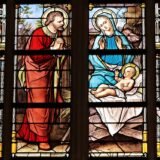Seeking Harmony Among Religions | East End Beacon
Pictured Above: Don Russo (l) and Rabbi Gadi Capela (r) at the model Seder in Greenport
The fundamental story behind Easter has its roots in Jesus’s Passover Seder that became The Lord’s Supper. The Seder, a meal commemorating the Jews’ exodus from Egypt, tells a story with power to draw together people of all faiths.
This past Wednesday, March 27, about 60 parishioners from many faiths gathered at Greenport’s Congregation Tifereth Israel for a Model Seder organized by the congregation’s rabbi, Gadi Capela and the leaders of Greenport Ecumenical Ministries (GEM), a group of leaders of houses of worship on the North Fork.
It was the last of GEM’s series of weekly community meals at North Fork houses of worship throughout Lent.
GEM’s President, Don Russo, a former Roman Catholic priest, was at seminary in Rome during the Second Vatican Council in the 1960s, and learned there firsthand of the Church’s goal to reach out to people of other faiths. He and Rabbi Gadi have been leading interfaith discussions, along with Father Roy Tvrdik of the Shrine of Our Lady of the Island, for decades, and have taken interfaith groups on pilgrimages to Israel to learn about their shared faith.
“Father Roy asked me 18 years ago to lead a model Seder, and I was freaking out and trembling,” said Rabbi Gadi, who was not yet a rabbi at the time. But two miracles happened that night — the organizers had set up exactly enough chairs for the number of people who showed up, and during the reading of the story of Passover, at the portion read by “the child who does not know how to ask,” the person whose turn it was to read had just had a laryngectomy and needed to depend on the people sitting around him to read.
The experience led Rabbi Gadi to quit his career as a business analyst and turn instead to a life in the clergy, leading both the Greenport congregation and interfaith discussions with Mr. Russo and Father Roy through Project Genesis, a Jewish-Christian learning program that currently meets at St. Mark’s R.C. Church in Shoreham.
“We were one of the first” to have this sort of interfaith Seder, said Rabbi Gadi. “It kicked off three decades of dialogue. We really are in a new reality.”
“We’re not going to have peace in the world until we have peace among the religions, sitting around a table, schmoozing with one another,” Mr. Russo told the hungry crowd gathered for the mid-morning Seder in Greenport. “This is a microcosm.”
With humor and good spirit, the crowd followed Rabi Gadi’s instructions, breaking a piece of matzo in half and tucking it neatly into a napkin for later, a reminder of the hunger of the enslaved; sharing matzo ball soup and bitter herbs, salted metaphorically with the tears of the enslaved Israelites; and then dipping their fingers in a glass of wine repeatedly to mark each of the plagues they were rescued from in Egypt; learning and then repeating the joyful song “Dayenu,” “It Would Have Been Enough,” as they recounted each of the miracles.
Rabbi Gadi told the crowd the unleavened matzo has many meanings, but one of them is that “ego rises, and matzo doesn’t.”
“In the Christian tradition, humility is a true estimation of yourself, how God sees you,” said Mr. Russo.
The crowd then made sandwiches of matzo with bitter herbs, beets and charoset (a mixture of apples, walnuts and spices), piled their plates high with kugel and munched as Rabbi Gadi further explained how four children ask questions throughout the Seder, asking how this night is different from all other nights.

“We were rescued out of Egypt. That’s the key to Judaism and Christianity,” said Rabbi Gadi in the midst of the service. “But only 20 percent of the Jews made it out of Egypt. This is a memorial day, of the first holocaust of the Jewish people.”
“But suffering does not define all of Jewish history,” he said, adding that this particular holiday is both a primer on how to be free people and a celebration of their rescue from Egypt.
Throughout the service, a placard with the names of two brothers who are prisoners of Hamas in Gaza sat in the empty chair reserved for Elijah at the head of the table next to the rabbi. He prayed for their return to their families.
Rabbi Gadi’s parents were Yemenite Jews who walked for a year to reach the new state of Israel just after its formation in 1948. Born in Israel, he tells a personal story that many Americans who believe Israel to be a colonialist state don’t know, about the Jews who were in the Middle East for millennia before the state of Israel was formed.
“People who are trying to find military or political solutions — it won’t come through for them,” said Rabbi Gadi. “It’s about coming together in the shared holy lands. If you live in the spirit of light, it’s always widening. If you give light, it can be shared infinitely. It’s not territorial, which is about control.”
Rabbi Gadi said when he hears stories of personal religious experience from people of other faiths, he often says, “I don’t share your faith, but I share your faith.”
“If we have disagreements between the faiths, let’s start with what we agree upon,” he said of this process of interfaith dialogues. “We’re still talking about what we agree upon.”
He pointed out that there is a long tradition of dialogue between faiths, with leaders walking together and “praying with their feet” as Rabbi Joshua Heschel did when he marched across the Edmund Pettus Bridge in Selma, Alabama with Dr. Martin Luther King, on another journey toward freedom and self-determination for African Americans.
“We are a product of the Second Vatican Council,” he said of the group in Greenport.
Rev. Dr. Ann Van Cleef, Vice President of GEM and recently retired as pastor of the Orient Congregational Church, played the piano throughout the service, including the closing song “Eliyahu Hanavi,” a welcome to the Prophet Elijah to join the festivities.
“We all want to feed the hungry, house the homeless and find peace, and we can certainly set aside our theological differences and work toward that end,” she said, as the leaders of the houses of worship worked together to fold chairs and tables at the close of the meal.













